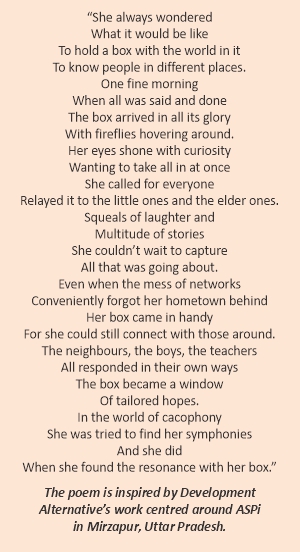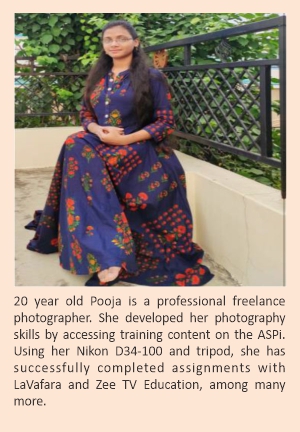ASPi – A Window to Tailored Hopes
Technology
and young girls in underserved areas is not a conventional match considered
actively. As per a study by LIRNEAsia, in India, only 43% of women own
 mobile
phones compared to almost 80% of Indian males. This gap further widens to
52% in rural areas. In a world that is hyper-connected with information —
available at the touch of a button for most of us, and even rural men, women
still lag in access. How do we expect them to define their aspirations — let
alone reach them — if they are systemically prevented from a basic right
like information?
mobile
phones compared to almost 80% of Indian males. This gap further widens to
52% in rural areas. In a world that is hyper-connected with information —
available at the touch of a button for most of us, and even rural men, women
still lag in access. How do we expect them to define their aspirations — let
alone reach them — if they are systemically prevented from a basic right
like information?
Value-driven technology represents a window to the future of work for young girls and their dreams and aspirations. Based on noticeable gaps in the system, under the la Caxia Foundation and Development Alternatives Work 4 Progress1 India programme, an idea blossomed to experiment with technology to overcome lack of connectivity, mobility and safety in workspaces faced by young rural women in Eastern Uttar Pradesh. Through a competitive process called Technology Challenge, partners Janastu3 from Bengaluru and Medha Learning Foundation4 from Lucknow were selected to deploy social innovation methodologies to reach young girls and open up new opportunities for them.
The aim of the technology challenge is to create
virtual co-working spaces to enhance access to entrepreneurial opportunities
for young girls and women. On ground, Medha put the ICT tools of Janastu to
use for dialogue sessions with communities in backward rural areas of
Mirzapur (U.P.). At first, due to societal divides it was not easy for the
girls to talk to each other about themselves or their families as they came
from different castes2. Learning from the initial work the two organisations
through facilitative work of DA on social innovation, adapted their
strategy. Medha and Janastu subsequently combined their vision and
co-created processes to design an electronic device where women between the
ages of 18–25 years can learn and share ideas, skills and talent within a
network. The prototype technology is called ASPi5 (based on unleashing
aspirations of young girls), that records audio and visual messages and
transmits them over a wider network. The technology began with the idea to
enable Medha and Janastu to listen to young girls as they went about their
day. The vision was to listen to them closely without much disruption to
their daily activities to understand their interactions with each other and
the technology, to co-shape the virtual co-working space.

As the ASPi was introduced, the speed of its impact on the lives of school-going girls was remarkable. The sheer curiosity to learn and use the technology triggered a change in behaviour of the young girls. They mobilised on their own, deciding on a place and time to meet up in groups of 5-7 and record their voices on ASPi in form of audio/video stories. As the girls became more comfortable with the technology, they began synchronising, annotating and sharing their recordings with each other. The initial stories of their daily routines, their families, childhood experiences and incidences evolved to significant topics with the girls speaking of their talent, aspirations and role models. Through the ASPi device, they could now share their stories with their families, community members and other groups.
Virtual peer-to-peer connections with girls using a similar ASPi device in other villages have now became possible through features like cloud share. The open virtual platform of ASPi to capture and share the voice with the world, provided these young minds a channel to express and reflect on their thoughts and ideas. Through ASPi, they began to explore the internet and social media platforms to connect with others of similar interests.
The ASPi in essence is an aspirational window. Today, through the device and with simple facilitative roles played by the organisations, girls are learning from each other, overcoming geographical and societal barriers. They are being introduced to subjects and areas like technology, photography, website development and even STEM research and robotics. Moreover, the virtual platform enables them to connect with mentors and experts in their areas of interest, to turn their aspirations into reality. ■
References:
1 https://www.work4progress.org/
2 https://en.wikipedia.org/wiki/Caste_system_in_India
3 https://janastu.org/
4 https://medha.org.in/
5 https://hackmd.io/pGk1fFIdSECY1QRs1yz9VA
6 https://www.amazon.in/shops/A1INT9OEJYD8SD?
7 https://ajhindidaily.in/?p=15999# ; https://ajhindidaily.in/?p=17557
Mayank Nautiyal
mnautiyal@devalt.org
Dinesh TB
dinesh@servelots.com
Preeti Singh
preeti.singh@medha.org.in